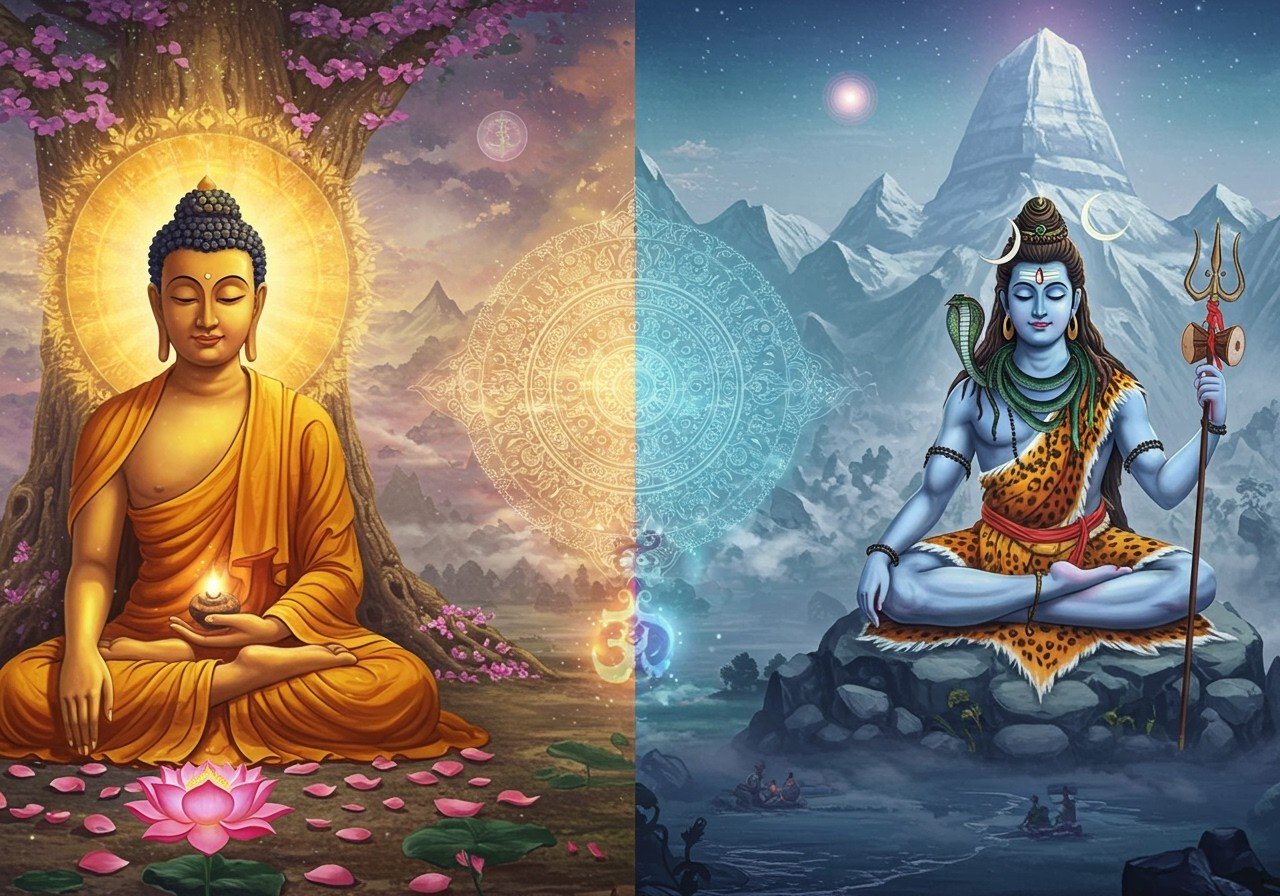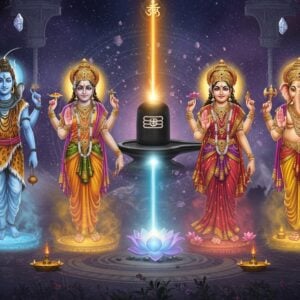
In the heart of Indian spirituality, the concepts of Nirvana and Moksha resonate deeply, shaping the beliefs and practices of countless seekers. These profound ideas represent the ultimate spiritual goals in Buddhism and Hinduism respectively. For those of us who cherish our traditions and seek a deeper understanding of our spiritual heritage, exploring these concepts offers a profound journey of self-discovery. This article delves into the similarities and differences between Nirvana and Moksha, shedding light on their unique paths to liberation.
Nirvana: The Buddhist Path to Enlightenment
Nirvana, in Buddhism, signifies the ultimate liberation from samsara, the continuous cycle of birth, death, and rebirth. This cycle is seen as a source of suffering, and Nirvana offers a way to transcend it. The path to Nirvana involves embracing the Eightfold Path, a set of principles that guide one towards ethical conduct, mental discipline, and wisdom.
Central to the concept of Nirvana is the understanding of Anatta, the principle of “no-self.” This concept suggests that there is no permanent, unchanging self or soul. Recognizing this impermanence is crucial for achieving liberation. Different Buddhist traditions, such as Theravada and Mahayana, offer nuanced interpretations of Nirvana. However, the core principle of overcoming desire and attachment remains constant, guided by the wisdom of the Four Noble Truths.
Moksha: The Hindu Path to Liberation
Moksha, in Hinduism, represents liberation from the cycle of rebirth and the attainment of union with the divine, often understood as Brahman, the ultimate reality. There are multiple paths to achieving Moksha, each emphasizing different aspects of spiritual practice. These include Bhakti Yoga (the path of devotion), Karma Yoga (the path of selfless action), Jnana Yoga (the path of knowledge), and Raja Yoga (the path of meditation).
Dharma, the principle of righteous conduct, plays a vital role in one’s journey towards Moksha. Fulfilling one’s dharma creates positive karma, which contributes to spiritual progress. The concepts of Atman (the individual soul) and Brahman (the universal consciousness) are essential for understanding Moksha. While Nirvana emphasizes the realization of “no-self,” Moksha focuses on the realization of the true self and its inherent unity with the divine. A Guru, a spiritual teacher, often plays a significant role in guiding seekers on their path towards Moksha.
You can find beautiful murtis of deities like Lord Shiva and Adiyogi at Poojn.in, Poojn.in, and Poojn.in. These murtis can serve as a focal point for your devotion and meditation, enhancing your spiritual practice.
Enlightenment: A Shared Aspiration
Both Buddhism and Hinduism recognize the profound significance of Enlightenment. In Buddhism, Enlightenment is often equated with Nirvana, signifying the realization of one’s true nature and the cessation of suffering. This awakening is marked by profound wisdom and compassion. The Buddha’s own enlightenment serves as an inspiration for countless practitioners.
Enhance your meditation practice with authentic puja items from Poojn.in. We offer a wide variety of high-quality items to support your spiritual journey.
In Hinduism, Enlightenment is understood as the realization of the true self (Atman) and its unity with Brahman. This realization leads to a state of profound peace and liberation from the limitations of the ego. This state of self-realization is achieved through spiritual knowledge (Jnana), meditation, and self-discipline. Ancient texts like the Upanishads offer guidance to seekers on this path, emphasizing the importance of inner transformation and the pursuit of wisdom.
Comparing Nirvana and Moksha
While both Nirvana and Moksha represent liberation from samsara and the cessation of suffering, they differ in their approach. Nirvana emphasizes the realization of “no-self,” while Moksha focuses on the realization of the true self and its unity with the divine. The cultural and philosophical contexts of Buddhism and Hinduism influence these distinct perspectives.
Explore the significance of Dharma and Karma in Hinduism here and learn more about the global reach of Hinduism here.
Both concepts have profound implications for ethical conduct within their respective traditions. They inspire practitioners to live with compassion, wisdom, and detachment from worldly desires. Community support and individual practices play significant roles in the pursuit of these spiritual goals. Understanding the nuances of Nirvana and Moksha provides a deeper appreciation for the rich tapestry of Indian spirituality and allows us to connect with the wisdom of ancient traditions.
Similarities and Differences: A Closer Look
While distinct in their philosophical underpinnings, Nirvana and Moksha share some common ground:
- Liberation from Samsara: Both Nirvana and Moksha aim to free the individual from the cycle of birth, death, and rebirth, which is seen as the root of suffering.
- Ultimate Spiritual Goal: Both represent the pinnacle of spiritual achievement within their respective traditions. They are the ultimate destinations on the path of self-discovery.
- Attainable through Practice: Both Nirvana and Moksha are attainable through dedicated spiritual practice. This might involve meditation, ethical living, selfless action, or the pursuit of knowledge, depending on the specific path followed.
- End of Suffering: Achieving either Nirvana or Moksha leads to the cessation of suffering. This is not simply the absence of pain, but a deeper sense of peace and liberation from the root causes of suffering.
Despite their similarities, key differences exist:
- Concept of Self: Buddhism emphasizes the concept of “no-self” (Anatta), suggesting that there is no permanent, unchanging self or soul. Hinduism, on the other hand, emphasizes the concept of Atman, the individual soul, which is ultimately seen as identical to Brahman.
- Path to Liberation: Buddhism primarily focuses on the Eightfold Path, which includes practices like mindfulness, meditation, and ethical conduct. Hinduism offers a wider range of paths, including Bhakti Yoga (devotion), Karma Yoga (action), Jnana Yoga (knowledge), and Raja Yoga (meditation). Each path offers a different approach to achieving Moksha.
- Nature of Liberation: Nirvana is often described as a state of “blowing out” or “extinction,” representing the cessation of craving and attachment. Moksha is often described as a state of union or oneness with Brahman, the ultimate reality.
FAQs: Exploring Common Questions
Many seekers on the path to spiritual understanding often have questions about Nirvana, Moksha, and Enlightenment. Here are some frequently asked questions:
Is Enlightenment the same as Nirvana or Moksha? In Buddhism, Enlightenment is generally synonymous with Nirvana. In Hinduism, it’s a step towards achieving Moksha, marking a deep understanding of the self and its connection to the divine.
Can Nirvana and Moksha be achieved in this lifetime? Yes, both traditions believe that liberation is possible in this lifetime through dedicated practice and deep realization. This is known as Jivanmukti in Hinduism.
What role do deities play in these paths? While Hinduism often involves devotion to deities as part of the path to Moksha, Buddhism primarily focuses on self-effort and wisdom without relying on a personal god.
What is the significance of Karma in these concepts? Karma, the principle of cause and effect, is significant in both traditions. It influences the cycle of rebirth, and actions aligned with dharma contribute to liberation. Explore our range of clay diyas and puja items to enhance your spiritual practice.
Poojn.in: Supporting Your Spiritual Journey
At Poojn.in, we understand the deep significance of these spiritual concepts and the importance of having access to authentic and high-quality items for your practice. We offer a wide range of products carefully curated to support your journey, whether you follow the Buddhist or Hindu path. From meditation cushions and mala beads to puja items and sacred texts, we strive to provide everything you need to create a sacred space for your practice.
Find everything you need for a fulfilling spiritual practice at Poojn.in. We are committed to providing high-quality, authentic items to support your journey towards inner peace and liberation.


